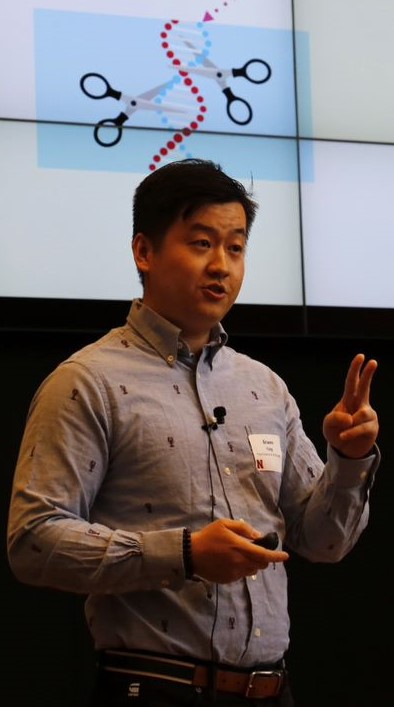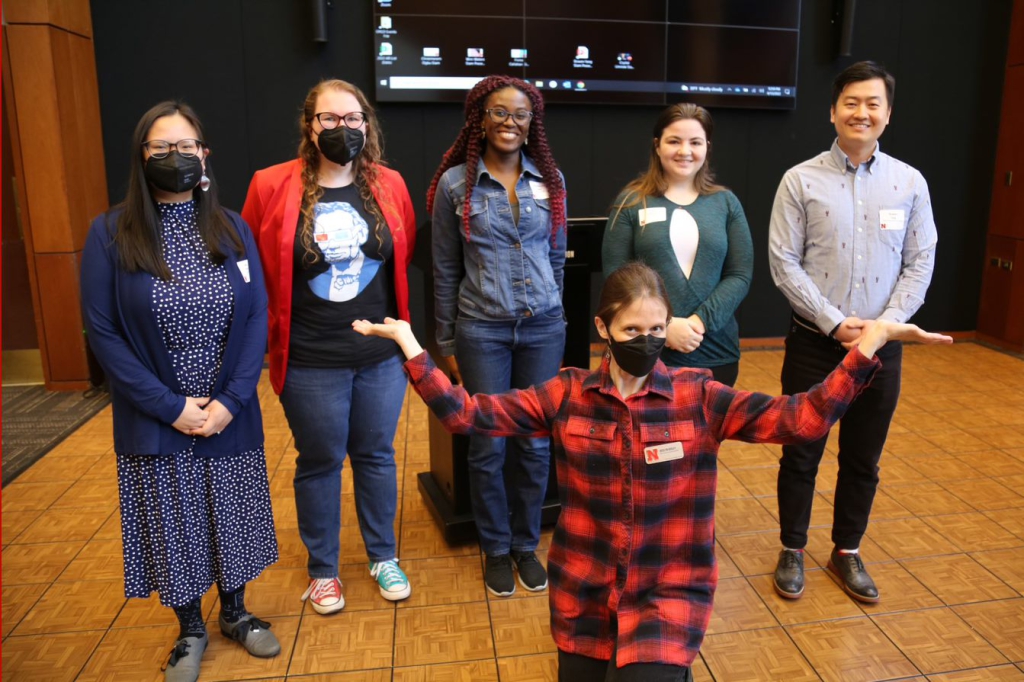Dan Moser, April 14, 2022
Students share research, life lessons in Slam presentation
Bowen Yang, a graduate student studying bioinformatics, encouraged his audience to better understand computer technology to benefit their work and their lives.
Yang was the audience’s choice as winner of the first-ever Student Research Days Slam, earning a $500 prize. The five students chosen for the slam, held April 13, were asked to answer this prompt: “What skill or ability have you developed through your research experience or creative activity that you think would make the world better if everyone had it?”
Several discussed how the scientific process they’ve learned – painstaking, imperfect and subject to setbacks – can apply to everyone and many real-world situations.
Yang said bioinformatics is a cross-disciplinary field of research that combines biology and computer science. Yang studies small proteins called anti-CRISPRs; technology and tools in the field are advancing rapidly.

“All of a sudden, biological scientists have the means to generate massive amounts of data at a relatively low cost,” he said. But all that data has ramped up the need for analysis.
“With a decent computer and somewhat limited programming skills, that data could be processed in minutes, if not seconds. And that is the power of bioinformatics.”
Anyone would benefit by understanding computer technology better, Yang said.
“We live in a world where computational technology is used in everything. It has changed the way we communicate and our fundamental way of life. But how many of us truly understand the fundamentals and principles behind a computer?” he said. “Learn some basic computational skills, such us a popular computational language, data mining skills, computer hardware principles. Trust me — in today’s world, it will benefit your life or work.”
Chinemerem Ogbu, a graduate student in biochemistry, talked about her research as a structural biologist, solving protein structures using X-ray crystallography.
Like much research, the work requires patience, she said. Proteins are grown into crystals, which are blasted with X-rays to get diffraction patterns eventually used to obtain a structure. It can take several years to find a suitable condition for the protein to crystallize.
Failures can occur along the way, and that’s all right, she said.
“When you do something and it doesn’t work, you learn one way not to do it,” Ogbu added.
And it applies outside her field, too.
“This knowledge is applicable to us as persons who might try a few things and it’s not working out how we would love it to. We learn that when it doesn’t work, it’s not the right condition and we should try it differently.”
Crystal Uminski, a graduate student in biological sciences, discussed science literacy as a three-dimensional process in which students engage in science and engineering practices to develop and apply disciplinary ideas and crosscutting concepts. The process can challenge teachers, she said.
As a student, Uminski dreaded tests. As a biology teacher, she’s come to appreciate them as a useful tool that helps students understand the most important things in a course.
“There’s a reason there’s the stereotypical phrase from students, ‘Is this going to be on the test?’ because that’s where their points are – that’s what they care about and that’s what they are motivated to learn,” she said.
The most successful tests – 3D tests — don’t focus on tiny details and facts but rather help students with critical thinking skills and building connections, Uminski said, driving her point home with an MC Hammer takeoff called “You Can Test This.”
Winifred Waters, a grad student in chemistry, said her work has taught her to tolerate frustration.
Waters’ research is in materials science. She works with two-dimensional materials – sometimes as thin as less than 1 nanometer and fragile and tricky to assemble. A mere speck of dust can set her back.
“This part of my research experience was incredibly frustrating,” but with practice, Waters said, she’s become much more resilient. “And the cool thing about frustration tolerance is that it’s transferrable to every aspect of my life.”
It’s made her a better teacher, too, as she reassures her students that it’s OK if an experiment doesn’t work.
Fiona Callahan, an undergrad in entomology, had a similar theme, speaking about adaptability in both research and life.
“I use this one skill in particular: ability to adapt to a situation. Sometimes things happen. A shortage of samples or a serious time crunch. You can’t simply give up.”
The Slam was part of Student Research Days, an annual event hosted by the Office of Research and Economic Development in partnership with Graduate Studies.






